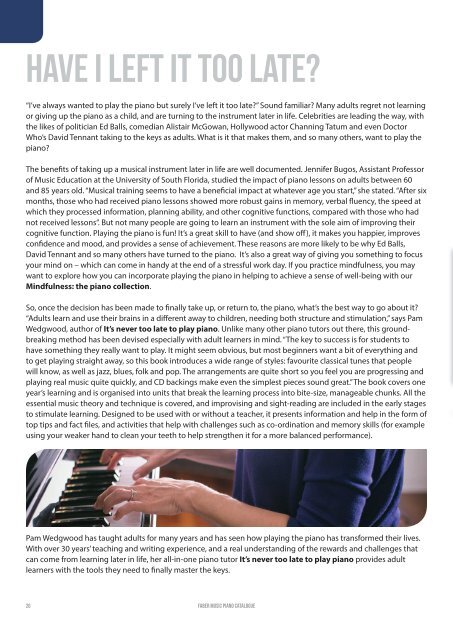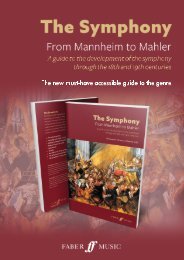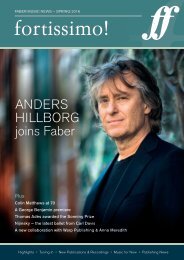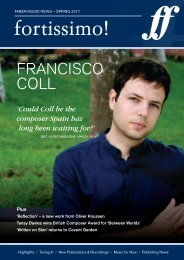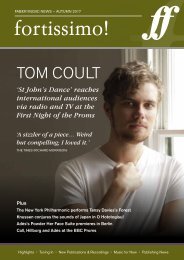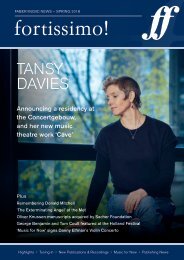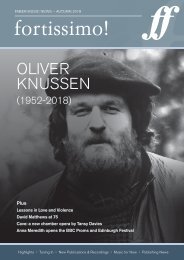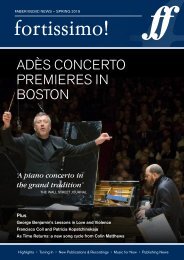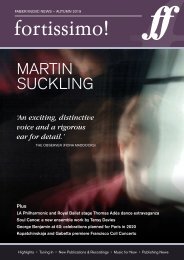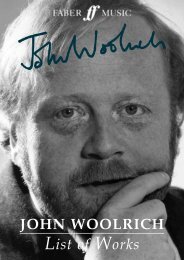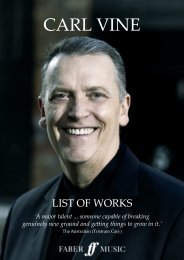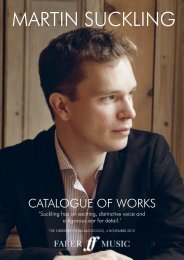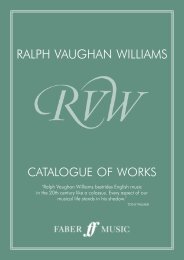Piano Catalogue
We’re extremely proud of our rich tradition of high-quality piano music and are constantly adding new and exciting publications to the list. We’ve created the Faber Music Piano Catalogue to help you to explore our extensive catalogue. We hope that this resource will help you find out more about the titles you already know, and highlight those hidden gems or new publications that you may not have come across before. And because we wanted to give you more than a catalogue, we’ve incorporated some elements from our popular Pianofforte to provide some extra insight from our composers and authors.
We’re extremely proud of our rich tradition of high-quality piano music and are constantly adding new and exciting publications to the list. We’ve created the Faber Music Piano Catalogue to help you to explore our extensive catalogue. We hope that this resource will help you find out more about the titles you already know, and highlight those hidden gems or new publications that you may not have come across before. And because we wanted to give you more than a catalogue, we’ve incorporated some elements from our popular Pianofforte to provide some extra insight from our composers and authors.
You also want an ePaper? Increase the reach of your titles
YUMPU automatically turns print PDFs into web optimized ePapers that Google loves.
Have i left it too late?<br />
“I’ve always wanted to play the piano but surely I’ve left it too late?” Sound familiar? Many adults regret not learning<br />
or giving up the piano as a child, and are turning to the instrument later in life. Celebrities are leading the way, with<br />
the likes of politician Ed Balls, comedian Alistair McGowan, Hollywood actor Channing Tatum and even Doctor<br />
Who’s David Tennant taking to the keys as adults. What is it that makes them, and so many others, want to play the<br />
piano?<br />
The benefits of taking up a musical instrument later in life are well documented. Jennifer Bugos, Assistant Professor<br />
of Music Education at the University of South Florida, studied the impact of piano lessons on adults between 60<br />
and 85 years old. “Musical training seems to have a beneficial impact at whatever age you start,” she stated. “After six<br />
months, those who had received piano lessons showed more robust gains in memory, verbal fluency, the speed at<br />
which they processed information, planning ability, and other cognitive functions, compared with those who had<br />
not received lessons”. But not many people are going to learn an instrument with the sole aim of improving their<br />
cognitive function. Playing the piano is fun! It’s a great skill to have (and show off), it makes you happier, improves<br />
confidence and mood, and provides a sense of achievement. These reasons are more likely to be why Ed Balls,<br />
David Tennant and so many others have turned to the piano. It’s also a great way of giving you something to focus<br />
your mind on – which can come in handy at the end of a stressful work day. If you practice mindfulness, you may<br />
want to explore how you can incorporate playing the piano in helping to achieve a sense of well-being with our<br />
Mindfulness: the piano collection.<br />
So, once the decision has been made to finally take up, or return to, the piano, what’s the best way to go about it?<br />
“Adults learn and use their brains in a different away to children, needing both structure and stimulation,” says Pam<br />
Wedgwood, author of It’s never too late to play piano. Unlike many other piano tutors out there, this groundbreaking<br />
method has been devised especially with adult learners in mind. “The key to success is for students to<br />
have something they really want to play. It might seem obvious, but most beginners want a bit of everything and<br />
to get playing straight away, so this book introduces a wide range of styles: favourite classical tunes that people<br />
will know, as well as jazz, blues, folk and pop. The arrangements are quite short so you feel you are progressing and<br />
playing real music quite quickly, and CD backings make even the simplest pieces sound great.” The book covers one<br />
year’s learning and is organised into units that break the learning process into bite-size, manageable chunks. All the<br />
essential music theory and technique is covered, and improvising and sight-reading are included in the early stages<br />
to stimulate learning. Designed to be used with or without a teacher, it presents information and help in the form of<br />
top tips and fact files, and activities that help with challenges such as co-ordination and memory skills (for example<br />
using your weaker hand to clean your teeth to help strengthen it for a more balanced performance).<br />
Pam Wedgwood has taught adults for many years and has seen how playing the piano has transformed their lives.<br />
With over 30 years’ teaching and writing experience, and a real understanding of the rewards and challenges that<br />
can come from learning later in life, her all-in-one piano tutor It’s never too late to play piano provides adult<br />
learners with the tools they need to finally master the keys.<br />
20<br />
Faber Music <strong>Piano</strong> <strong>Catalogue</strong>


